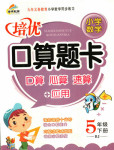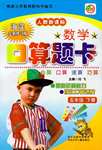题目内容
[ ]
B. pen
C. ruler

 培优口算题卡系列答案
培优口算题卡系列答案 开心口算题卡系列答案
开心口算题卡系列答案 口算题卡河北少年儿童出版社系列答案
口算题卡河北少年儿童出版社系列答案
Hi! I’m Harry. Life used to be kind of difficult for me. The muscles(肌肉) in my arms and legs are weak. I have to be in a wheelchair all day. I can’t use my legs at all, and I’m not too great with my hands. If I drop something it stays dropped until someone picks it up for me. I can’t open doors or switch lights on and off. Carrying everything I need for school is a problem too.
Now things are easier. I have a helping hand. Pete is a golden dog that has been trained to help kids like me. Pete was at dog training school for two years to learn how to do different tasks. I had to be trained too. I had to learn how to give Pete instructions and how to take care of him.
When Pete is working he doesn’t play around. My friends know they are not to pet him or call him when he is working. He can pull my wheelchair and pick up things I drop. Pete carries my books and lunch on his back. He pushes the button on the school lift and opens some kinds of doors. He even knows how to switch lights on.
But best of all, Pete is here when I need a friend.
【小题1】According to the passage, who is Harry’s helping hand?
| A.Pete | B.His teacher. | C.His brother | D.His parent |
| A.Because his legs are broken. |
| B.Because his leg muscles are weak. |
| C.Because he is too lazy. |
| D.Because he likes it. |
| A.Pete can clean Harry’s room. | B.Pete can switch lights on. |
| C.Pete can pull Harry’s wheelchair. | D.Pete can push the button on the school lift. |
| A.Pete is only a helpful tool for him. |
| B.Pete is with him all the time. |
| C.Pete is a funny dog to make him happy. |
| D.Pete is not only a helping hand but also his good friend. |
A Brown University sleep researcher has some advice for people who run high schools: Don’t start classes so early in the morning. It may not be that the students who nod off at their desks are lazy. And it may not be that their parents have failed to enforce(确保) bedtime. Instead, it may be that biologically(生物学上)these sleepyhead(贪睡者)students aren’t used to the early hour.
“Maybe these kids are being asked to rise at the wrong time for their bodies,” says Mary Carskadon, a professor looking at problem of adolescent (青春期的)sleep at Brown’s School of Medicine.
Carskadon is trying to understand more about the effects of early school time in adolescents. And, at a more basic level, she and her team are trying to learn more about how the biological changes of adolescence affect sleep needs and patterns(方式).
Carskadon says her work suggests that adolescents may need more sleep than they did at childhood, no less, as commonly thought.
Sleep patterns change during adolescence, as any parent of an adolescent can prove. Most adolescents prefer to stay up later at night and sleep later in the morning. But it’s not just a matter of choice---their bodies are going through a change of sleep patterns.
All of this makes the transfer(迁移)from middle school to high school---which may start one hour earlier in the morning----all the more difficult, Carskadon says. With their increased need for sleep and their biological clocks set on the “sleep late, rise late” pattern, adolescents are up against difficulties when they try to be up by 5 or 6 a.m. for a 7:30 a.m. first bell. A short sleep on a desktop may be their body’s way of saying. “I need a timeout.”
【小题1】Carskadon suggests that high schools should not start classes so early in the morning because _______.
| A.it is really tough for parents to enforce bedtime |
| B.it is biologically difficult for students to rise early |
| C.students work so late at night that they can’t get up early |
| D.students are so lazy that they don’t like to go to school early |
| A.turn around | B.agree with others | C.fall asleep | D.refuse to work |
| A.Adolescents depend more on their parents. |
| B.Adolescents have to choose their sleep patterns. |
| C.Adolescents sleep better than they did at childhood. |
| D.Adolescents need more sleep than they used to. |
| A.Adolescent health care. |
| B.Problems in adolescent learning. |
| C.Adolescent sleep difficulties. |
| D.Changes in adolescent sleep needs and patterns. |
